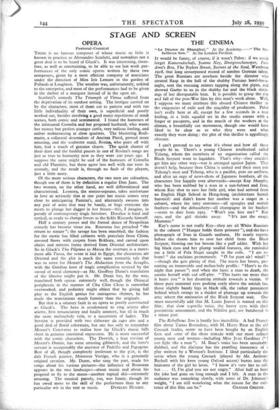THE CINEMA
"Le Drame de Shanghai." At the Academy.—" The Re- bellious Son." At the London Pavilion.
IT would be funny, of course, if it wasn't Pabst: if we could forget Kameradschaft, Yeanne Ney, Dreigroschenoper, Pan- dora's Box, The Pyless Street, Secrets of the Soul, Westfront 1918, that long unsurpassed record of sombre German talent The great Russians are nowhere beside the director who created Rasp in the hall of the shabby Parisian hotel-for-a.. night, sent the rescuing miners tapping along the pipes, and showed Garbo to us in the shabby fur and the black stock- ings of her disreputable beat. It is possible to grasp the rise and fall of the post-War film by this man's work alone. Well, I suppose we must attribute this absurd Chinese thriller to the exigencies of exile and the stupidity of producers. Pabst isn't really here at all, except for a few seconds in a neat knifing, in a little squalid set in the studio corner with a forger ot passports, and in the march ot the workers at the climax, a beautifully cut movement, though one would have liked to be dear as to who they were and what exactly they were doing : the plot of this thriller is appallingly obscure.
I can't pretend to say what it's about and how all these people fit in. There's a young Chinese intellectual called Tcheng, whom the members of an organisation called the Black Serpent want to liquidate. That's why—they cou:dn't get him any other way—war is arranged against Japan. That doesn't help, because then China is united and their men join Tcheng's men and Tcheng, who is a pacifist, puts on uniform, and after an orgy of news-shots of Japanese bombers, all the characters live happily ever afterwards—except Kay Murphy, who has been stabbed by a man in a sun-helmet and Ivan, whom Kay shot to save her little girl, who had arrived from an English High School in Hong-kong (architecture Scotch baronial) and didn't know her mother was a singer in a cabaret, where the tatty costumes—all spangles and ostrich feathers—and the debauchery—all champagne in ice buckets —seem to date from 1925. "Won't you kiss me?" Kay says, and the girl shrinks away. "It's just the rouge, Mummie."
Kay's name is not really Kay—they are all White Russians in the cabaret ("Hunger holds them prisoner "), and she has a photograph of Ivan in Guards uniform. He nearly repents before she shoots him to save her child from the Black Serpent, blowing out her bosom like a puff adder. With her big black eyes and her plump soulful features, she reminded me a little of Pola Negri caught in the coils. "I am re- born! " she exclaims prematurely. "0 for pure air! wind!" —though she gets plenty of that. he toasts her lovers, pre- senting an immovable and melancholy profile : "Here's to the night that passes "; and when she lures a man to death, she carries herself with sad self-pity. "This hurts me more than it hurts you" is her daunting attitude towards a victim. 0 those pure maternal eyes peeking coyly above the ostrich fan, those slightly bandy legs in black silk, the rather prominent behind which swings in a thicket of plumage up towards the attic where the emissaries of the Black Serpent wait. One must mournfully add that M. Louis Jouvet is wasted on this film : that slow soporific voice, the heavy eyes with their pessimistic amusement, and the Nihilist gait, are butchered in a minor part.
The Rebellious Son is hardly less incredible. A bad French film about Tarass Boomdeay, with M. Harry Baur as the old Cossack leader, seem to have been bought by an English firm and some of the shots remade with our most refined young men and women—including Miss Joan Gardiner ("I can fight like a man "). M. Baur's voice has been unsuitably dubbed, and the dialogue has the prattling innocence of a play written by a Women's Institute. I liked particularly the scene when the young Cossack (played by Mr. Anthony Bushell with his keen young Oxford accent) bursts into the bedroom of the girl he loves. "I know it's very late to call. but . . . 0, I'm glad you are not angry." After half an hour the joke had gone on long enough and I left. A man in the audience was remarking slowly, with some of Dr. Johnson's weight, "I am still wondering what the reason for the exis-








































 Previous page
Previous page